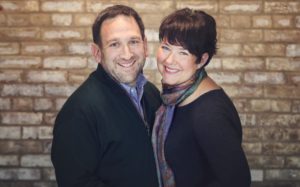Spoiler Alert: This story has a happy ending.
So about two weeks after Dan’s mom died we got some potentially scary news about Cassie’s health. She’d just had a routine doctor’s appointment. So routine that she hadn’t even wanted Dan to attend (a first). No scans. No test results. Just some blood work and a short visit with the doctor. Purely routine.
Then they called. Cassie’s blood work had come back. Her kidney counts were way off — her creatinine levels were elevated much higher than they should have been. They told her not to panic (thanks) and that it might just be that Cassie was dehydrated at the time of the tests. They instructed her to drink a lot of water, lay off Ibuprofen and come back in a week to be re-tested.
Left unsaid was that it might not be alright. That this might be the start of something new. Something bad. That maybe we should panic. The internet is not your friend at times like this. You know there’s that joke that if you look up an illness online you are always “three clicks from death.” Well that’s not as funny when you have metastatic breast cancer. When Cassie googled high kidney counts and MBC much of what came back was really scary. Some people do develop kidney trouble — not good. Sometimes that’s caused by the meds — also not good because we want to stay on these meds as long as possible.
We started joking darkly about kidney failure. Visions of dialysis ran through our heads. It was too much, but what could we do? Cassie started a “water project” of at least 64 oz daily. She avoided intense workouts and rested more. We also told a lot of people because we were scared and this was our current reality.
And then everything was fine. We went back to the doctor (together this time). They did the test and asked us to stay for the results. We sat anxiously in the waiting room and then Cassie’s nurse came out and gave us the all clear. Probably just dehydrated she said. Keep drinking water. Nothing to look at here.
Whew, what a relief. But also what a ride. A true roller coaster of a week and certainly not the last one by a long shot. That got us thinking how do we handle these rides? How do we react but not over-react? How much do we share, when and with whom? We don’t want to shut out our family and friends but we also don’t want to scare them unnecessarily. Also how do we incorporate these regular ups and downs into our life as a couple? One of the things that is becoming increasingly clear to both of us is that as much as we ever thought we were “in control” of our lives before, we certainly aren’t any more. In so many ways, the MBC roller coaster is in control and we are just along for the ride. That doesn’t mean we don’t have lots we still get to decide on a daily basis, but it does mean that almost all of the big things are out of our hands. Makes us think a lot about the illusion of control we were operating under before.
We are realizing (as with so much of this whole journey) that how we handle things will likely vary on a case-by-case basis and that the bigger thing is to try and emotionally prepare ourselves for the constant ups and downs. That’s just part of our new reality which is too bad because Cassie really hates roller coasters.
